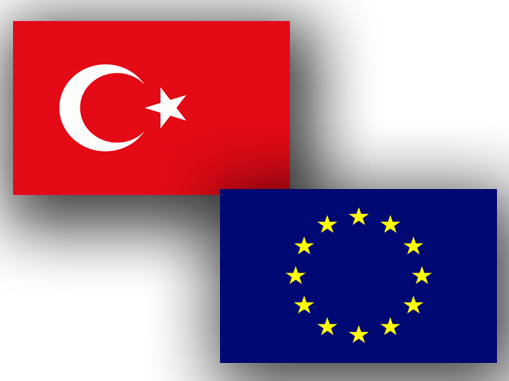The European Commission's annual progress report will underline that the Turkish economy is still strong and on the right track, but warn of structural problems, in particular the current account deficit and vulnerability to external factors Today`s Zaman reproted.
"Turkey's growth performance in a context of global economic volatility in recent years confirms the economy's improved fundamentals and enhanced resilience to shocks. However, the large structural current account deficit and relatively high inflation indicate the persistence of significant underlying imbalances in the Turkish economy. Overall, the functioning of market mechanisms has remained appropriate," says a draft of the EU Commission report obtained by Today's Zaman.
The "economic criteria" section of the progress report, which will be published on Oct. 16, offers both warnings and praise for the Turkish economy; Turkish officials managed to stop the economic slowdown and re-accelerate economic activity. Deputy Prime Minister Ali Babacan is praised for his vigorous monitoring of the financial system. The draft, however, stresses the threat of the external deficit.
"Overall, the economic slowdown has ceased and economic activity has re-accelerated in the first four months of 2013," said the draft. In last year's report, the EU also praised the economy, but warned of a dramatic slowdown. The "economic criteria" section of last year's report said, "Overall, economic growth is slowing down, from high levels, due to weaker domestic demand." In this year's report, the EU also underlines the huge amount of gold exported to Iran in 2012. "Export volumes accelerated to an annual growth rate of 17.2%. Most of this impressive rise was, however, accounted for by extraordinary exports of non-monetary gold to Iran," the report says.
This assessment is noteworthy as European economies are still struggling to get out of the financial crisis that erupted back in 2008. While underlining that consensus on economic policy has been preserved, the draft report cautions Turkey over its external debt structure, capital flow reversals and a fragmentation of responsibilities among state structures that makes economic cooperation more difficult.
"The external deficit remains large. Combined with a precarious external debt structure, it makes Turkey vulnerable to capital flow reversals, either in the context of increasing global risk aversion regarding emerging market assets or as a result of a rise in perceived country-specific risks. The fragmentation of responsibilities of between government bodies continues to complicate coordination of budgeting and medium-term economic policy making," the report says.
One of the positive points in the draft report is data showing that the per capita GDP disparity between Turkey and the EU is getting narrower. "In 2012, the per capita GDP of Turkey amounted to 56% of the EU average, up from 52% in 2011."
The draft notes that Turkey's current account has continued to register a large deficit, which leaves the Turkish currency vulnerable to a sudden loss of investor confidence. Turkey's foreign trade, the report emphasizes, has been distorted by strong fluctuations in exports and imports of non-monetary gold in recent years. "The bulk of the current account deficit was financed by portfolio investments in 2012 while net inflows of foreign direct investments covered a relatively small share (17.8%) of the deficit. The high degree of dependence on shorter-term capital inflows exposes Turkey to changes in global risk appetite," the draft says. It stresses that external imbalances have remained significant, and that short-term financing has made Turkey vulnerable to sudden changes in global investor sentiment.
The EU Commission gives good marks to Ankara on the labor market, inflation and employment but says undeclared work remains a widespread practice. "Employment has continued to grow at a robust rate, unemployment has continued to edge down but the female labor participation rate has remained very low," says the draft, which notes that inflation has been reduced significantly but is still above the central bank's target.
"The labor market performed relatively well in 2012 despite the economic slowdown. The annual unemployment rate fell to 8.2% from 8.8% in 2011. Employment increased by 1.1 million persons or 4.6%. The employment rate increased by 0.6 percentage points to 52.8%. The labor force increased by 5%, which is significantly faster than the 1.9% increase in the working age population. By mid-March 2013, employment was 4.6% higher year-on-year, the unemployment rate was up by 0.2 percentage points year-on-year and the labor force participation rate had reached 50.2%," the draft says.
The EU says fiscal performance has been "broadly satisfactory" but adds that no progress was made on fiscal transparency. The Turkish economy's dependence on capital inflows is cited as an important risk. "The dependence on capital inflows is a macroeconomic vulnerability which makes Turkey prone to boom-bust cycles. The Turkish economy remains vulnerable to bouts of financial uncertainty and changes in global risk sentiment and there is scope for improving the macroeconomic policy mix."
The report says the legal system was functioning relatively well but saw no new initiatives to better it.
Praising Babacan, the draft says the financial sector performed well and has continued to show resilience thanks to vigorous monitoring of the system, including systemic risks and their management.
The report criticizes public procurement procedures: "The legal framework for public procurement continued to comprise various exemptions and is still not in line with the EU acquis. Overall, there has been no progress in enhancing the transparency of state aid."
The draft also stresses that Turkey's international price competitiveness declined dramatically in 2012 due to rising unit labor costs and currency appreciation.






